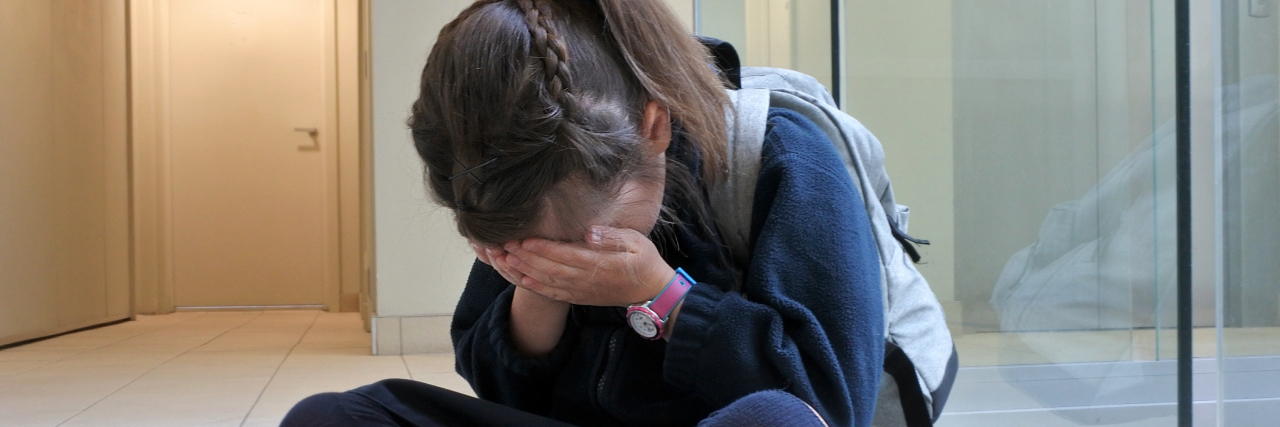Your child has anxiety. Your child may be struggling to get to school each day. Maybe he is downright refusing to go. Maybe she is complaining of stomachaches and headaches before bed or before school. Your child may be struggling to make friends or keep them. Maybe certain subjects are difficult. Maybe he is having a hard time taking in all of the stimulation in the classroom or school, and needs a break.
The reasons for why your child is anxious about and in school can be many. But the bottom line is, if your child is focused on his anxiety, he is not focusing on the academics as well. So now the cycle slowly becomes voracious, because all of the variables are making each of the other variables that much worse. That is, that dangerous internal monologue can look a little something like this:
“I can’t focus because I’m worrying about my mom’s safety, so now I missed the math lesson. I don’t know how to solve these problems but I can’t ask for help. My teacher will be mad at me. Now I have a worksheet of 20 problems for homework and I don’t know how to do them. And I have Science homework, and Spelling homework. And Samantha won’t play with me on the playground today. Did I do something wrong? What did the teacher just say? Was that the bell? I think I have to pack up? Are we going to gym? I can’t do this!”
What can I do to help my child in school? Are there support plans? What are they called?
When looking at support plans for your child, you have two options: a 504 Accommodation Plan or an Individualized Education Plan (IEP).
504 Accommodation Plan
A 504 Accommodation Plan is one that provides supports for your child after you gain a diagnosis. This plan is created by the parent, principal, school nurse, general education teacher and guidance counselor in order to create the accommodations needed to support your child’s anxiety. It is a plan that is valid for one year, and then re-evaluated annually. I suggest re-evaluating the accommodations every three months as your child’s needs will likely be more intense towards the beginning and the middle of the school year.
Accommodations can include:
If your child is struggling to go to school, advise the principal, guidance counselor and your child’s teacher so that they can begin to support you in getting your child to school each day. We know that the longer your child is out of school, the harder it is to return.
- Designate a staff member to wait for child at drop off so that separation and transition can be quick.
- Ask the student resource officer or a staff member to come to your home and transport your child to school.
- If your child is struggling to come to school for the entire day, modify the duration of the day to half and then add one class period on a systematic basis.
- For some children who do not like to come in when the mass of students is entering the building, allow the student to come into the building before or after the bell rings when the halls are clear.
- Provide a designated staff member, preferably the guidance counselor, with whom your child can meet regularly and on an as-needed basis.
Individualized Education Plan
An Individualized Education Plan (IEP) is a plan that provides special education and related programs for students whose anxiety is severe enough that it is negatively impacting your child’s ability to access the curriculum. A special education program may include an in-class resource or co-teaching for particular subjects. You will be assigned a case manager on the child study team (CST), and testing is often provided by the CST. If not, you are able to gain a private psycho-educational evaluation by a clinical psychologist that you can then share with the CST.
For students who have a co-morbid specific learning disability or ADHD that is exacerbating the anxiety and the anxiety is exacerbating the learning disability or ADHD, more support may be needed. An out of class resource program may be needed for one or more subjects in which the curriculum is modified to the child’s present level of functioning within that subject.
Accommodations can also include the ones listed above for a 504 Accommodation Plan. Some others that may be helpful are:
- Ask the student to complete fewer items within the classroom (odds or evens).
- Decrease homework items by one-third or half.
- Avoid calling on child in class — wait for the child to volunteer.
- Offer a break when child seems overwhelmed or scared.
- Offer the child a safe place in the classroom or school building where he/she can decompress.
- Allow for extended time on class assignments, tests and quizzes.
- Allow for student to take a test/quiz or complete a writing assignment in a quiet area of classroom or in a different room.
Over the years, we are seeing what a strong impact anxiety is having on our children’s ability to function within school, or even getting to school. The impact is strong and real. For children who are able to pull it together during the day, they often “explode” by the time they get home. After-school and evening hours can be painful for parents at home.
Parents, share with your child’s teacher, guidance counselor and principal so you are not carrying the burden of your anxious child alone. Allow the school staff to provide supports throughout the day so your child is not carrying the weight of their anxiety all day long and then unloading it on you at home.
Getty image by chameleonseye

